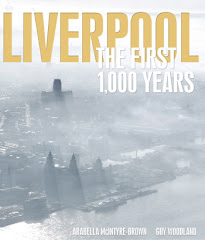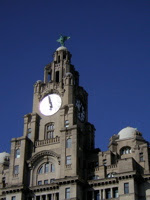Very few cities in the world are famous enough to need no further address. No-one needs to ask where New York is, or San Francisco, Beijing, Paris, London, Sydney, Moscow, Hong Kong, Athens, Rome ... or Liverpool. No matter where you go in the world (outside Britain), say you come from Liverpool and people’s faces light up with big smiles. It’s almost certainly going to be one of two things that people associate with Liverpool: football or music. In the USA, it’s music; in Brazil it’s football; Japan – music; Greece – football.
But whatever foreigners think of when they hear the word ‘Liverpool’, it is positive. In Britain, the image is rather different. You’d think that Liverpool sprang into being 30 years ago, fully formed as a depressed northern city populated by work-shy, bolshie trouble makers, comedians and criminals. As for industry, or culture, or learning – tsk! Everyone knows the docks are dead, the city is a hideous blot, Scousers are stupid and aggressive, and they wouldn’t know culture if they fell over it. Everyone knows that.
When I first came to this city taxi drivers – having established that I wasn’t from round here – would commiserate with me at having to move to Liverpool. ‘It’s not so bad, love. Why do you come ‘ere, anyway?’ They’d be pleased when I ticked off a dozen reasons why I’d left London and moved up here, and told them that it had taken me half a day, on my first visit, to decide that this was the city for me. I had gone back, put my flat on the market, sold up and escaped north without a backwards glance.
It’s not just that Liverpool people are friendly, or that I could afford to buy a house here. It’s not only that Liverpool is warmed by the Gulf Stream or that the air is cleaner here than most other cities, or that it has 2,500 listed buildings and as many acres of park and woodland. It’s the kindness of strangers, the human scale of the city, the lightness of heart, the battling spirit, the imagination, the passion and the expression.
When southern friends and family heard I was moving here, they said: ‘You’re mad!’ or ‘How brave!’. They all changed their minds when they came up here to visit. I felt instantly welcome here; I’m proud to call Liverpool home, and can’t imagine living in another city.
As Liverpool reaches the end of its first thousand years, it can look back on a story that has been turbulent, thrilling, pioneering, desperate, joyful, ruthless, shaming, wealthy, powerful, depressing, glorious, hopeless, and hopeful. Like any city, Liverpool has its problems. Half a million people living in a small space will create dramas, tragedies and comedies; in this city the dramas are more exciting, the comedies funnier and the tragedies as tragic as anywhere else.
In the 1960s Liverpool was one of the coolest cities on the planet; by the 1980s it was the pariah city of Britain. How quickly people forget – within living memory Liverpool has been one of the world’s most powerful trading cities and the main link between the Old and New Worlds. But it’s not the first-ever radio broadcast that people remember, or the beginnings of the railways and the canals; not the world’s largest Anglican cathedral or the start of the NSPCC and the RSPCA. The name Toxteth doesn’t remind people of the Domesday Book and King John’s hunting park. Liverpool is more famous for an ordinary road in a pleasant suburb (Penny Lane) than for a sporting event watched by over a billion people each spring.
Writing this book has given me a new perspective on Liverpool: looking at 1,000 years of the city’s life, the shape of its growth and the turning points in its story, how its strengths in one century became its weaknesses in another, the heights of its power, the speed of its decline and the guts with which it is regenerating itself.
Geographically English, Liverpool is not an English city. From its earliest days Liverpool has attracted people from other places, people with an appetite for the new and the different – people with the courage to travel and explore, people with ideas, and people with the vision to back them. Risk takers, pioneers, entrepreneurs, inventors, reformers – this is not a place for quiet contemplation, but for doing, changing, trying.
God knows Liverpool has got a long way to go. But this is an extraordinary city, with a world-leading past and a world-class future; how exciting to be in at the start of its renaissance and the first of its next 1,000 years.
– Arabella McIntyre-Brown
Contents and introduction

New edition on the way
A completely revised and updated second edition is in progress, ready for publication in May 2008. Order your copies now for a special advance offer price.
More of the book
Order your copy now
Photographer's note
Everyone has their favourite views of Liverpool and sees things in their own way; I have tried to be impartial in photographing the city for this book, and hope that the images show Liverpool as a city rick in history and magnificent in stature. The words cover Liverpool's past as well as its present, but the images are all contemporary and will become a social document of Liverpool in 2001. We cannot know what will become valuable in the future, as the city evolves. It is often the mundane or unconsidered details that become precious in time to come. Who knows which images in this book will become important in ten or 100 years' time? -- Guy Woodland, 2001
Blog Archive

No comments:
Post a Comment